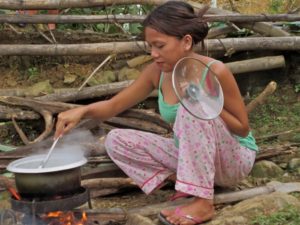Milk, a 2015 documentary by Noemi Weis about how political and commercialized childbirth and infant feeding has become, is being shown at Camosun College this month. Event organizer Samara Oscroft, who is also a Nexus contributor, says that although getting this screening together with her Geography 102 class has been a lot of work, she’s very excited to help share this information with students.
“We are focusing on sub-Saharan Africa this semester, and my first thought was about how in the ’70s and ’80s, the Nestlé corporation went into developing countries and supplied new mothers with formula for free,” says Oscroft. “When you don’t use your breast milk you lose it, and so these mothers were placed into a really precarious situation where they were basically forced to continue purchasing a product that they would never have used in the first place.”

While formula isn’t terrible for babies, it’s very expensive and less nutritious than breast milk is. So what happens when a mother can’t produce enough breast milk and can’t afford formula?
“Breast milk is such a whole food for infants,” says Oscroft. “It contains all of the vital nutrients that an infant needs, the different kinds of fats, the antibodies; it even helps to populate an infant’s gut biome. And something that has been growing in popularity over the past, maybe, decade is to donate breast milk. Some people make lots of it—like, incredible amounts—so much that they can’t even use it all. And some people can’t make it at all. There are so many different reasons for using a milk bank, and they have them all over the world.”
Mothers in need can get breast milk for free from these banks. There are difficulties, however—while supply can be a problem, Samara says that the biggest issue facing milk banks is funding.
“It’s less about having enough to fill the demand and a little bit more about having the ability to store it,” says Oscroft. “So, being able to pasteurize and store the donated milk, being able to supply breast pumps to new moms, all of that stuff is so much more expensive than a lot of us would ever think.”
Entrance to the screening—which is also being presented by The Holding Space Education Series and the Camosun College African Awareness Committee—is by donation, and baked goods will be available for purchase at the event. All the proceeds will go to the Human Milk Bank at Pumwani Maternity Hospital in Nairobi, Kenya.
“We do really want this to be super accessible, so if someone can’t afford to pay, then it’s more important for them to access the information than it is for them to make a donation,” says Oscroft. “We are hoping for about $5 [per donation], and also hoping that we’ll get some people who are able to pay a little bit more, but, like I say, it’s more about sharing the information than it is about gathering cash.”
Milk
7 pm Wednesday, March 11
By donation, Young 310, Lansdowne campus
holdingspaceeducationseries.com
